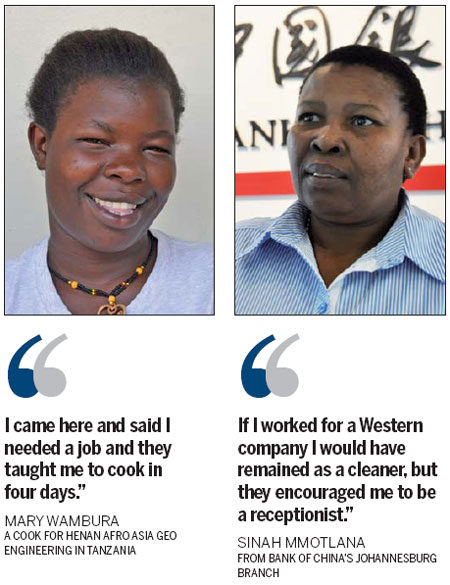In the company of good friends
Updated: 2013-06-21 09:00
By Andrew Moody and Zhao Yanrong (China Daily)
|
|||||||||||

Sara Elhassan says she did not develop an interest in China until she studied in the West.
Even though China is a major investor in Sudan, the 28-year-old Sudanese freelance writer and editor had very little exposure to the world's second-largest economy until she studied Asian languages at Arizona State University.
"Even that wasn't my original idea. I was going to study Spanish but my father didn't approve because he said China will be the next superpower in the next 20 years and that I might like to get in on that."
She eventually went on to study Chinese for a year at Fudan University in Shanghai.
"As I studied Chinese, my interest grew and grew and I developed an interest in the culture and history as well as language."
For many thousands of Africans, their exposure to China comes from working for a Chinese company.
Sinah Mmotlana, 48, has worked for Bank of China's Johannesburg branch for 13 years, firstly as a cleaner and then for the past five years as a receptionist.
"I have learnt to speak some of the language. You have to if you work here. I find the Chinese very good to work for.
"They have really helped me progress. If I worked for a Western company I would have remained as a cleaner, but they encouraged me to be a receptionist."
She says many young Africans, including her 31-year-old son who is a clerk in her home city Pretoria, are fascinated by China.
"When I go home he is always asking me about the Chinese and I think he would like to go to China to work."
The Chinese culture that Mary Wambura has been exposed to is food. The 23-year-old works as a cook for gold exploration company Henan Afro Asia Geo Engineering near Mwanza in Tanzania, where she cooks dishes for Chinese workers.
"I came here and said I needed a job and they taught me to cook in four days," she says.
"It took me two years to really learn how to cook Chinese noodles and steamed bread."
However, Elhassan, who is now based in Khartoum, says that Sudan has far more exposure to Western culture than Chinese culture.
"This is only partly due to Sudan being a former British colony also. I think it is much more to do with Facebook, Twitter and YouTube as well as Western movies and music. This is all much more accessible than Western culture," she says.
"In Sudan, the local population and the Chinese expatriate population do not tend to socialize or come into contact that much."
(China Daily European Weekly 06/21/2013 page15)
Today's Top News
List of approved GM food clarified
ID checks for express deliveries in Guangdong
Govt to expand elderly care
University asks freshmen to sign suicide disclaimer
Tibet gears up for new climbing season
Media asked to promote Sino-Indian ties
Shots fired at Washington Navy Yard
Minimum growth rate set at 7%
Hot Topics
Lunar probe , China growth forecasts, Emission rules get tougher, China seen through 'colored lens', International board,
Editor's Picks

|

|

|

|

|

|





